考研复试英语听力
研究生复试到底会不会考英语听力?附常考题型
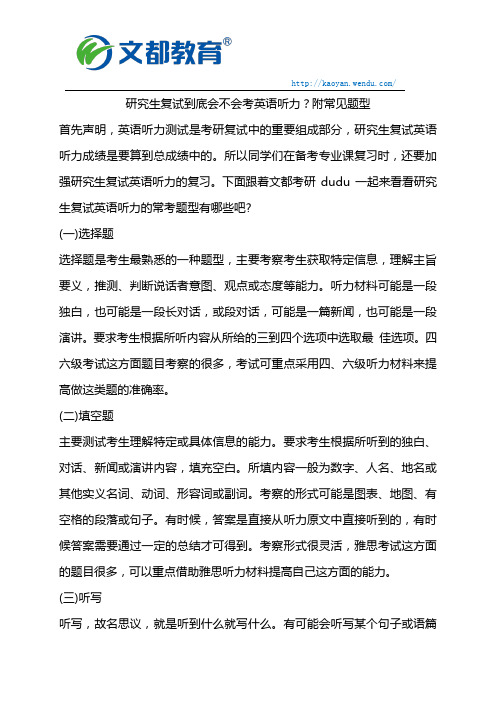
/研究生复试到底会不会考英语听力?附常见题型首先声明,英语听力测试是考研复试中的重要组成部分,研究生复试英语听力成绩是要算到总成绩中的。
所以同学们在备考专业课复习时,还要加强研究生复试英语听力的复习。
下面跟着文都考研dudu一起来看看研究生复试英语听力的常考题型有哪些吧?(一)选择题选择题是考生最熟悉的一种题型,主要考察考生获取特定信息,理解主旨要义,推测、判断说话者意图、观点或态度等能力。
听力材料可能是一段独白,也可能是一段长对话,或段对话,可能是一篇新闻,也可能是一段演讲。
要求考生根据所听内容从所给的三到四个选项中选取最佳选项。
四六级考试这方面题目考察的很多,考试可重点采用四、六级听力材料来提高做这类题的准确率。
(二)填空题主要测试考生理解特定或具体信息的能力。
要求考生根据所听到的独白、对话、新闻或演讲内容,填充空白。
所填内容一般为数字、人名、地名或其他实义名词、动词、形容词或副词。
考察的形式可能是图表、地图、有空格的段落或句子。
有时候,答案是直接从听力原文中直接听到的,有时候答案需要通过一定的总结才可得到。
考察形式很灵活,雅思考试这方面的题目很多,可以重点借助雅思听力材料提高自己这方面的能力。
(三)听写听写,故名思议,就是听到什么就写什么。
有可能会听写某个句子或语篇中缺失的单词或短语(常见),也可能会听写整个句子或一个语篇(不常见)。
/(四)简答题或补全句子简答题主要考察考生理解具体信息或总体信息的能力。
要求考生根据所听到的独白或对话简要回答所给出的问题。
做这类题目的时候,考生应重点抓住疑问词,明确题目所问的方向。
常见的疑问词有what, which, who, why, when, where, how。
还要注意,这类题的答案大部分时候都有字数限制,要注意作答时一定不要超过字数限制。
还有一点,就是在答题时注意自己所写的答案是否符合所在句子的语法规则,比如时态、语态、单复数及介词搭配等是否正确,否则,也不被扣分的。
考研复试英语听力怎么准备

考研复试英语听力怎么准备考研复试英语听力怎么准备,考生平时要怎么备考?想知道的小伙伴看过来,下面由小编为你精心准备了“考研复试英语听力怎么准备”仅供参考,持续关注本站将可以持续获取更多的资讯!考研复试英语听力怎么准备考研复试英语听力备考方法第一步:选取正确的听力材料英语听力部分,大多数学校都以现有的成熟考试为参考。
大家在准备听力复试的过程中,对于现有的成熟英语考试的听力部分一定要重视。
要做到在考研复试中对英语听力有针对性的准备,选取正确的听力材料是重中之重。
要做到从自己的实际能力出发来选取听力材料,太难或者太简单都不利于考生正确地对自己的听力能力进行评估,正常速度的听力材料即可。
如:六级听力、托福听力和雅思听力,在准备的过程中可以有针对性地练习这部分的真题,听力难度可根据自己的实际情况进行由易到难的选择,做到有步骤,有阶段的听力准备。
第二步:脑记和笔记相结合在进行听力的过程中,即使是记忆力再好的人也不可能在短时间内对一篇陌生的听力文章完全记住,这就需要大家在进行听力训练的时候做到脑记和笔记相结合。
对于笔记,主要是对于一些关键词进行记忆,主要是一些数字,衔接词,如:but,yet,and,so,first,finally等,用自己最熟悉或者最简单的符号来进行书面表达,只要自己能识别的,汉字、代码、符号等都行。
因此这就需要在平时的训练过程中就要做到有意识的将所听到的关键词用笔进行速记,以便于自己听得全,记得多。
脑记则是对大脑记忆能力的一种考察,但是对于大部分同学来说,即使记忆力再好,在真正的复试场上也会因为紧张忘记所听到的内容。
因此对于脑记,主要是对于听力内容主体线路的梳理,明白文章主要讲什么就行,对于特别细节的内容则没必要进行记忆。
因此在听力中需要做到笔记与脑记相结合,脑记把握主体线路,笔记把握重要节点,并结合所记下的内容,反复多次进行文内容梳理,以做到在较短的时间内快速提升英语听力。
第三步:总结提升听力文章中难免会出现各式各样的陌生词汇,涉及各个专业。
考研英语_复试听力、口语的备考大攻略
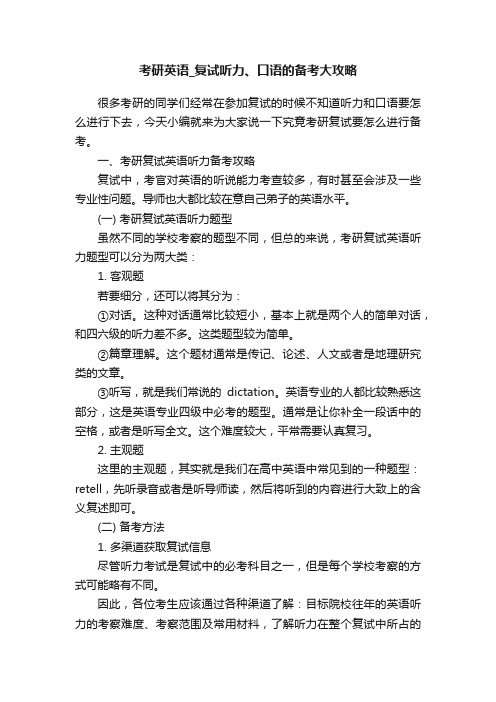
考研英语_复试听力、口语的备考大攻略很多考研的同学们经常在参加复试的时候不知道听力和口语要怎么进行下去,今天小编就来为大家说一下究竟考研复试要怎么进行备考。
一、考研复试英语听力备考攻略复试中,考官对英语的听说能力考查较多,有时甚至会涉及一些专业性问题。
导师也大都比较在意自己弟子的英语水平。
(一) 考研复试英语听力题型虽然不同的学校考察的题型不同,但总的来说,考研复试英语听力题型可以分为两大类:1. 客观题若要细分,还可以将其分为:①对话。
这种对话通常比较短小,基本上就是两个人的简单对话,和四六级的听力差不多。
这类题型较为简单。
②篇章理解。
这个题材通常是传记、论述、人文或者是地理研究类的文章。
③听写,就是我们常说的dictation。
英语专业的人都比较熟悉这部分,这是英语专业四级中必考的题型。
通常是让你补全一段话中的空格,或者是听写全文。
这个难度较大,平常需要认真复习。
2. 主观题这里的主观题,其实就是我们在高中英语中常见到的一种题型:retell,先听录音或者是听导师读,然后将听到的内容进行大致上的含义复述即可。
(二) 备考方法1. 多渠道获取复试信息尽管听力考试是复试中的必考科目之一,但是每个学校考察的方式可能略有不同。
因此,各位考生应该通过各种渠道了解:目标院校往年的英语听力的考察难度、考察范围及常用材料,了解听力在整个复试中所占的分数权重,以及本专业对英语听力的要求程度等。
英语听力部分,大多数学校都以现有的成型考试为参考。
考生在复习时可以有针对性地做一些六级或托福听力或雅思听力或新闻英语听力的试题,找找做题的节奏和感觉。
在了解相关信息之后,考生可结合自己的情况,制定出相应的备考计划,进行针对性训练。
2. 精听和泛听相结合精听需要我们把每一个句乃至每一个单词都写出来。
在写的过程中,考生可以很快发现自己在哪一方面需要加强训练,是在语音方面、语调方面、词汇方面,还是文化背景知识方面。
泛听,是指考生听录音材料的时候,只需要将材料中的关键信息抓住,不必把听到的每一句都写出来。
考研复试 英语听说能力测试
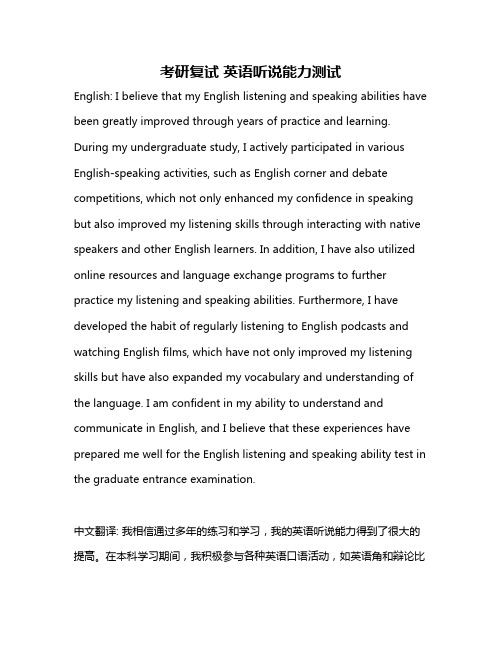
考研复试英语听说能力测试English: I believe that my English listening and speaking abilities have been greatly improved through years of practice and learning. During my undergraduate study, I actively participated in various English-speaking activities, such as English corner and debate competitions, which not only enhanced my confidence in speaking but also improved my listening skills through interacting with native speakers and other English learners. In addition, I have also utilized online resources and language exchange programs to further practice my listening and speaking abilities. Furthermore, I have developed the habit of regularly listening to English podcasts and watching English films, which have not only improved my listening skills but have also expanded my vocabulary and understanding of the language. I am confident in my ability to understand and communicate in English, and I believe that these experiences have prepared me well for the English listening and speaking ability test in the graduate entrance examination.中文翻译: 我相信通过多年的练习和学习,我的英语听说能力得到了很大的提高。
考研复试前如何准备英语听力和口语
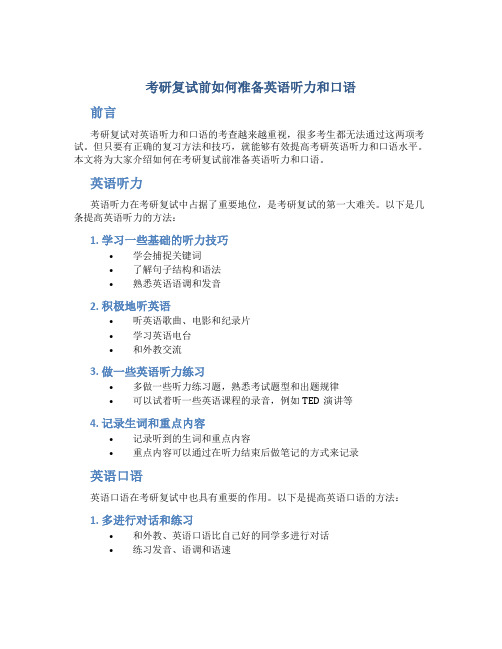
考研复试前如何准备英语听力和口语前言考研复试对英语听力和口语的考查越来越重视,很多考生都无法通过这两项考试。
但只要有正确的复习方法和技巧,就能够有效提高考研英语听力和口语水平。
本文将为大家介绍如何在考研复试前准备英语听力和口语。
英语听力英语听力在考研复试中占据了重要地位,是考研复试的第一大难关。
以下是几条提高英语听力的方法:1. 学习一些基础的听力技巧•学会捕捉关键词•了解句子结构和语法•熟悉英语语调和发音2. 积极地听英语•听英语歌曲、电影和纪录片•学习英语电台•和外教交流3. 做一些英语听力练习•多做一些听力练习题,熟悉考试题型和出题规律•可以试着听一些英语课程的录音,例如TED演讲等4. 记录生词和重点内容•记录听到的生词和重点内容•重点内容可以通过在听力结束后做笔记的方式来记录英语口语英语口语在考研复试中也具有重要的作用。
以下是提高英语口语的方法:1. 多进行对话和练习•和外教、英语口语比自己好的同学多进行对话•练习发音、语调和语速2. 逐渐增大口语表达范围•逐渐增加词汇量,扩大口语表达范围•学习使用不同的口语表达方式和习惯用语3. 模仿外教发音•听外教讲课,模仿外教的发音和语调•学习美式或英式发音的区别4. 了解和学习口语考试评分标准•学习口语表述的结构和能量的要求•熟悉各项口语考试的评分标准,哪些方面可以得分总结考研复试对英语听力和口语的要求越来越高,通过学习并掌握上述方法,考生可以提高自己的英语听力和口语水平。
在考试前,考生还应该多做一些模拟考试和练习,以便更好地应对考试。
研究生复试英语听说能力测试
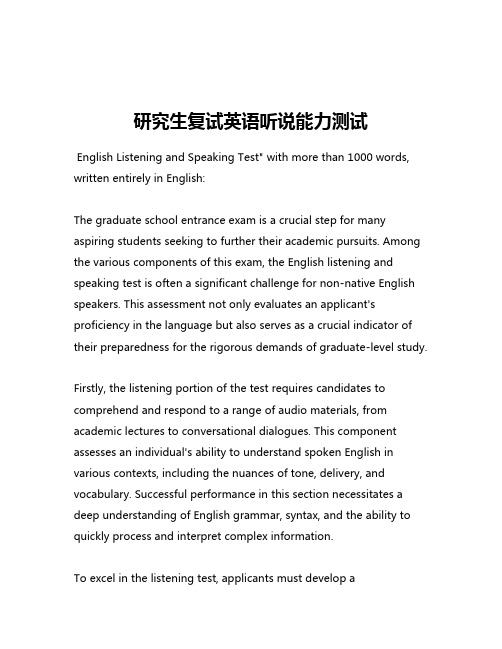
研究生复试英语听说能力测试English Listening and Speaking Test" with more than 1000 words, written entirely in English:The graduate school entrance exam is a crucial step for many aspiring students seeking to further their academic pursuits. Among the various components of this exam, the English listening and speaking test is often a significant challenge for non-native English speakers. This assessment not only evaluates an applicant's proficiency in the language but also serves as a crucial indicator of their preparedness for the rigorous demands of graduate-level study.Firstly, the listening portion of the test requires candidates to comprehend and respond to a range of audio materials, from academic lectures to conversational dialogues. This component assesses an individual's ability to understand spoken English in various contexts, including the nuances of tone, delivery, and vocabulary. Successful performance in this section necessitates a deep understanding of English grammar, syntax, and the ability to quickly process and interpret complex information.To excel in the listening test, applicants must develop acomprehensive understanding of academic English, which often includes specialized terminology and discourse patterns. This can be achieved through extensive exposure to English-language media, such as podcasts, lectures, and news broadcasts, as well as regular practice in comprehending and summarizing the main ideas and key details from these sources.Additionally, the speaking section of the graduate school entrance exam evaluates an applicant's ability to articulate their thoughts and ideas in a clear, coherent, and organized manner. This component may involve tasks such as delivering a short presentation, engaging in a structured discussion, or responding to prompts on a range of academic and personal topics.Effective preparation for the speaking test requires a multifaceted approach. Candidates must not only possess a strong command of English vocabulary and grammar but also develop the ability to organize their thoughts, maintain a logical flow of ideas, and communicate with confidence and clarity. Regular practice in public speaking, group discussions, and mock interviews can help applicants hone these essential skills.Moreover, the speaking test often assesses an individual's ability to think critically and respond spontaneously to unexpected questions or scenarios. This requires a deep understanding of the subjectmatter, as well as the ability to think on one's feet and articulate nuanced responses. Engaging in discussions with native English speakers, participating in debate clubs, or seeking feedback from language tutors can be invaluable in developing these crucial abilities.One of the key challenges faced by non-native English speakers in the graduate school entrance exam is the need to balance their academic knowledge with their language proficiency. Applicants must not only demonstrate their expertise in their chosen field but also convey their ideas effectively in English, which may not be their primary language.To overcome this challenge, candidates can adopt a holistic approach to their preparation. This may involve seeking out language-learning resources, such as English conversation classes, online language-learning platforms, or private tutoring, to strengthen their overall English skills. Additionally, they can practice integrating their academic knowledge with their language abilities by engaging in mock interviews or writing practice essays on relevant topics.Furthermore, the graduate school entrance exam's English listening and speaking test often assesses an applicant's ability to adapt to different communication styles and contexts. This may includeresponding to questions from panel members with diverse backgrounds, engaging in discussions with peers from various cultural and linguistic contexts, or presenting to an audience with varying levels of English proficiency.Developing cultural awareness and the ability to communicate effectively in diverse settings can be crucial in navigating the graduate school entrance exam. Candidates can enhance these skills by participating in international student organizations, attending cross-cultural events, or engaging in virtual exchanges with peers from different countries.In conclusion, the English listening and speaking test in the graduate school entrance exam is a significant hurdle for many non-native English speakers. However, with a comprehensive and strategic approach to preparation, applicants can develop the necessary skills to excel in this component of the exam. By focusing on improving their overall English proficiency, integrating their academic knowledge with language abilities, and cultivating cultural awareness and adaptability, candidates can increase their chances of success and pave the way for their future academic and professional endeavors.。
研究生复试英语听力
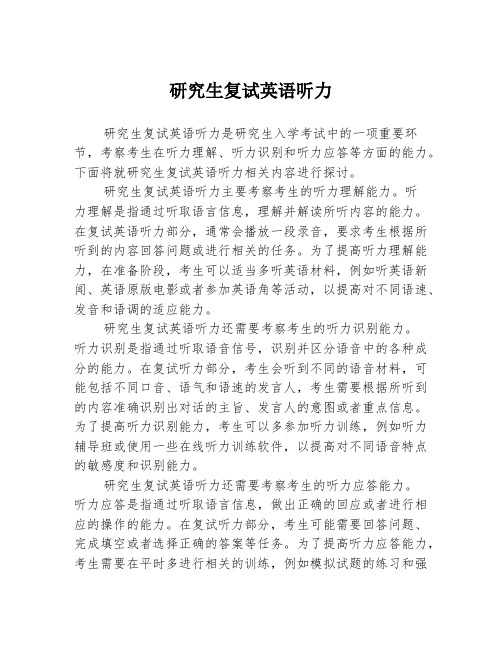
研究生复试英语听力研究生复试英语听力是研究生入学考试中的一项重要环节,考察考生在听力理解、听力识别和听力应答等方面的能力。
下面将就研究生复试英语听力相关内容进行探讨。
研究生复试英语听力主要考察考生的听力理解能力。
听力理解是指通过听取语言信息,理解并解读所听内容的能力。
在复试英语听力部分,通常会播放一段录音,要求考生根据所听到的内容回答问题或进行相关的任务。
为了提高听力理解能力,在准备阶段,考生可以适当多听英语材料,例如听英语新闻、英语原版电影或者参加英语角等活动,以提高对不同语速、发音和语调的适应能力。
研究生复试英语听力还需要考察考生的听力识别能力。
听力识别是指通过听取语音信号,识别并区分语音中的各种成分的能力。
在复试听力部分,考生会听到不同的语音材料,可能包括不同口音、语气和语速的发言人,考生需要根据所听到的内容准确识别出对话的主旨、发言人的意图或者重点信息。
为了提高听力识别能力,考生可以多参加听力训练,例如听力辅导班或使用一些在线听力训练软件,以提高对不同语音特点的敏感度和识别能力。
研究生复试英语听力还需要考察考生的听力应答能力。
听力应答是指通过听取语言信息,做出正确的回应或者进行相应的操作的能力。
在复试听力部分,考生可能需要回答问题、完成填空或者选择正确的答案等任务。
为了提高听力应答能力,考生需要在平时多进行相关的训练,例如模拟试题的练习和强化训练,以提高在有限时间内对所听到的信息进行有效处理和应答的能力。
总之,研究生复试英语听力是研究生入学考试中的重要环节,对考生的听力理解、听力识别和听力应答能力进行考察。
考生在准备阶段应多听英语材料,提高对各种语音特点的适应能力,并进行相关的听力训练,以提高自己在复试英语听力中的表现。
研究生复试英语听力

研究生复试英语听力Research Graduate English Listening Test (700 words) Section 1: Short dialogues (20 questions)1. M: What time is our group meeting tomorrow?W: It's at 10 a.m. in the conference room.2. M: Have you finished reading the article for today's class? W: No, I haven't had time to read it yet.3. M: Did you enjoy the movie last night?W: Yes, it was very entertaining.4. M: Are you going to the university party this weekend? W: Yes, I'm planning to go with some friends.5. M: Can I borrow your notes from the lecture?W: Sure, I can lend them to you after class.6. M: I can't find my keys anywhere.W: Have you checked your jacket pocket?7. M: What do you think of the new professor?W: I think she is very knowledgeable and approachable. 8. M: Can you help me with my math homework?W: Of course, I'd be happy to assist you.9. M: What's the weather like today?W: It's sunny and warm, perfect for going out.10. M: Would you like some tea or coffee?W: I'll have a cup of tea. Thank you.Section 2: Longer dialogues (5 questions)You will hear a conversation between two people discussing a news article. Listen to the dialogue and answer the following questions.11. What is the news article about?12. Why does the man find the article interesting?13. What is the man's opinion on the topic discussed in the article?14. What does the woman think about the article?15. What action does the woman plan to take after reading the article?Section 3: Academic lecture (5 questions)You will listen to a lecture by a professor on the topic of climate change. Listen to the lecture and answer the following questions.16. How does climate change affect the ecosystem?17. What are some of the solutions suggested by the professor tomitigate climate change?18. What role does deforestation play in climate change?19. What are the consequences of rising sea levels?20. What can individuals do to help combat climate change? Note: The answers to the questions will not be provided here. This is only a sample listening test; actual test questions may vary.。
- 1、下载文档前请自行甄别文档内容的完整性,平台不提供额外的编辑、内容补充、找答案等附加服务。
- 2、"仅部分预览"的文档,不可在线预览部分如存在完整性等问题,可反馈申请退款(可完整预览的文档不适用该条件!)。
- 3、如文档侵犯您的权益,请联系客服反馈,我们会尽快为您处理(人工客服工作时间:9:00-18:30)。
Underweight Asians Face Higher Risk of DeathA new study of more than 1.1 million people in six Asian countries finds that, like Westerners, Asians are more likely to die if they are overweight or obese. However, some of the highest death rates were seen in people who were severely underweight.Many previous studies have found that the risk of death increases as body-mass index increases. Body-mass index, or BMI, is a measure of body fat based on height and weight. The trouble is, those studies mostly analyzed Europeans and other Westerners. So scientists couldn't be sure if the results applied to other groups.To find out, Wei Zheng of Vanderbilt University and his colleagues collected data from China, Taiwan, South Korea, Japan, Bangladesh, and India. Adding up all the numbers, they concluded that the relationship between BMI and death rate in these Asian populations is generally consistent with studies of Westerners."Those people with lowest mortality in East Asian countries are those with normal weight," Zheng said. "And then with the reduced BMI and also increased BMI, they have increased risk of death."That part about those with "reduced BMI" is important because proportionately, more people in Asia are at the lower end of the BMI scale."For example, those with BMI less than 15, so this study shows really those with very low BMI have very high risk of death. This is a clear message for those people, [they] need to gain weight."The study also highlighted a surprising difference between East Asians and South Asians. Among the Indians and Bangladeshis, a higher BMI - in the overweight and obese range - did not translate into a notably higher death rate. Zheng says it might be that their weight reflected prosperity and a higher position in their community."They had relatively high socioeconomic status, so they had better access to health care," he suggested.Long History, Unclear Future for 'Golden Rice'This is the VOA Special English Agriculture Report.White rice is the world's most popular form of rice. But it goes through a milling process that removes many nutrients. As a result, people who eat a poor diet based on white rice may not get enough vitamin A.Each year an estimated two hundred fifty thousand to half a million children go blind from vitamin A deficiency. The World Health Organization says half of them die within a year of losing their sight. Vitamin A deficiency is a problem especially in Africa and Southeast Asia.So scientists thought of an answer. They combined white rice with plant compounds that the body can change into vitamin A. The rice contains beta-carotene and other carotenoids. These plant colorings give the rice a golden color.The scientists also thought of a plan to give away this Golden Rice for free to poor farmers. But the rice is genetically engineered. They say it cannot be made using traditional methods to breed plants.The scientists worked for ten years, until nineteen ninety, to develop the technology to add genes to rice. Then it took nine more years to get the genes they wanted into the seed.The first field tests took place in two thousand four at Louisiana State University in the United States. Golden Rice is currently being tested in the Philippines. It is still not available for general use.Co-inventor Ingo Potrykus says rice with two added genes will be available in twenty-thirteen. One gene comes from maize, or corn, and the other from a soil bacterium.Mr. Potrykus is retired from the Swiss Federal Institute of Technology. He blames the delays on too many rules about genetically modified crops.Opponents say such crops may cause environmental damage by breeding with conventional plants. Opponents also question the safety of biotech foods.Mr. Potrykus says Golden Rice has never been shown to be unsafe for the environment or people. Many agricultural organizations support the project.But there are also critics, including researchers for the environmental group Greenpeace. Several months ago they questioned whether Golden Rice could do much for vitamin A deficiency. They said releasing genetically modified rice in Asia could permanently change traditional rice varieties and wild ancestors of rice.And that's the VOA Special English Agriculture Report, written by Jerilyn Watson. For more news about rice research, go to . I'm Bob Doughty.States Put Pressure on Public UnionsThis is the VOA Special English Economics Report.Americans have been watching the protests in the Middle East and North Africa -- and closer to home. Workers in Wisconsin, and now some other states, have been protesting efforts to limit the negotiating power of government employees.Wisconsin's newly elected governor, Scott Walker, says limits are needed on labor unions to help cut a deficit in the state budget. The Republican governor proposes to end collective bargaining rights for most public employees except on the issue of wages.The bill has led to big, noisy demonstrations that began earlier this month in Madison, the state capital.PROTESTERS: "This is what democracy looks like!"The bill would not affect police or firefighters. They are barred from striking. But firefighter Mahlon Mitchell came to protest anyway.MAHLON MITCHELL: "This is ground zero for the nation."Democrats in the state Senate fled to the neighboring Midwestern state of Illinois. They want to prevent the Republican majority in the Wisconsin Legislature from passing the bill which they consider anti-union. Labor unions are a traditional base of support for the Democratic Party.Governor Walker says the state could have to start dismissing workers unless the Democrats return to debate what he calls a budget repair bill.Dennis Dresang is professor emeritus of political science at the University of Wisconsin. He says the modern history of the state helps explain the strong reaction.DENNIS DRESANG: "Wisconsin was the first in the nation to establish the right of public employees to bargain collectively, and it's a real shock to a lot of people that these rights would be taken away."Collective bargaining rights differ from state to state. Lawmakers in Indiana, Michigan and Ohio have also proposed limits on unions representing public employees. Critics say politicians are using state budget problems as an excuse for union-busting -- an effort to take away rights to organize.Unions have been shrinking in private industry. The Labor Department says only seven percent of workers in the private sector now belong to one. But more than one-third of government workers hold union cards. Local governments are the most unionized. Over forty-two percent of workers like teachers, health care workers and public safety employees are union members.But labor protests are not the only political dispute capturing attention right now. A budget battle in Washington could force the federal government to suspend many operations at midnight next Friday. The last government shutdown happened fifteen years ago. It lasted a record twenty-one days.And that's the VOA Special English Economics Report, written by Mario Ritter. For more news, go to ,Where we also invite you to tell us your thoughts about organized labor. I'm Steve Ember.Looking for Answers to Rising Coffee PricesThis is the VOA Special English Economics Report.Food prices are at their highest level since the United Nations Food and Agriculture Organization began keeping records in nineteen ninety. The causes include bad weather and growing demand. Some experts also blame the use of food crops to make fuel.But higher food prices are not always the result of limited supplies.Coffee prices have jumped almost fifty percent in six months. Prices have reached a thirteen-year high. Yet growers expect their current crop to be almost ten percent bigger than the last one.JM Smucker is an American company known for its jellies and fruit spreads. But Smucker also owns Folgers, America's top-selling packaged coffee. And it owns Dunkin' Donuts, which sells coffee to wash down the doughnuts at its stores.On Tuesday, Smucker said it would raise the prices of its coffee products by an average of ten percent. It said the increase is driven by the higher prices for coffee beans.Experts say coffee prices are rising mainly because people are willing to pay more. Coffee sellers like Mark Warmuth say tastes are changing and more people want a good cup of coffee.MARK WARMUTH: "There's no right or wrong answer with regard to ‘What's a good cup of coffee?' A lot of it has to do with personal preference or taste."Mark Warmuth owns the M.E. Swing Coffee Company in Alexandria, Virginia, near Washington. He says big coffee sellers like Starbucks help his business by building a base of customers who want something better.MARK WARMUTH: "They're seeking something that would be better than what they can buy at Starbucks. They're seeking out smaller, boutique, artisan, craft coffee roasters, which I consider us to be, a boutique coffee roasting company. What we can do is source better quality beans and supply them at a fresher level because we're smaller and we can cater to the smaller metro area. That helps us compete with bigger companies."Yet Mr. Warmuth can thank those bigger companies like Starbucks for spreading the idea of coffee as an affordable luxury. The thinking goes that during hard times, people might not go on a trip but they might be willing to pay extra for good coffee.The company supplies restaurants and other businesses, but also has a store in Washington near the White House. Customers pay thirteen dollars for less than half a kilogram of beans -- about double the price of other brands.Greater demand for high-quality coffee has helped drive coffee prices higher. That includes greater demand among Brazilians. Brazil is the world's largest exporter of coffee.People in India are also drinking more coffee. Starbucks just announced plans to enter that market in a deal with India's Tata Coffee company.Groups Offer Ideas to Cut US DeficitsThis is the VOA Special English Economics Report.Continuing debt problems in Greece and Portugal. The banking crisis in Ireland. Atrillion-dollar deficit in the United States. These are all reasons why high levels of public debt are a big worry around the world.Countries that keep spending a lot more than they earn may not be able to repay their debts. That risk of default can make it harder and costlier for them to borrow more money. Heavy debt can also affect a country's competitiveness.Voter anger at government spending and taxes helped lead to the big Republican gains in America's elections this month.President Obama says for the economy to improve, the government must cut spending and reduce its deficit. In February, he formed the National Commission on Fiscal Responsibility and Reform. The two chairmen are Erskine Bowles, a Democrat, and Alan Simpson, a Republican.Last week, the chairmen presented their own ideas for how to cut the federal deficit to about two percent of the economy by twenty fifteen. The administration estimates this year's deficit at about ten and a half percent.The two chairmen say their proposals would cut the deficit by almost four trillion dollars over the next ten years. One hundred billion would come from the military. Other proposals would cut the federal workforce by ten percent and freeze civilian pay.The chairmen propose to simplify the tax laws and reduce tax rates. But they also propose to cut some popular tax breaks. One target is deductions for interest paid on home mortgage loans over five hundred thousand dollars.Another proposal would add two years to the full retirement age for Social Security -- raising it to sixty-nine by about twenty seventy-five.The commission includes current and former lawmakers from both parties. The group is supposed to reach a compromise acceptable to at least fourteen of the eighteen members by December first.Other groups are offering their own debt reduction plans. Former senator Pete Domenici and former Clinton administration official Alice Rivlin led a task force that presented its plan on Wednesday.That plan aims to save six trillion dollars over ten years.?It would freeze federal spending for several years, change the tax laws -- and create a national sales tax.Obama Urges Steps to Strengthen EconomyThis is the VOA Special English Economics Report.This week, President Obama proposed new measures to lift the economy. The central bank in its latest report said there was continued growth in the past several weeks, but with "widespread signs" of slowing.Congressional elections are November second. One new survey showed that forty-nine percent of likely voters think Republicans should control Congress. Other polls find that about sixty percent of Americans think the country is going in the wrong direction.President Obama gave a speech Wednesday near Cleveland, Ohio. He proposed a tax plan for businesses that make capital improvements, like buying new equipment.BARACK OBAMA: "And I'm proposing that all American businesses should be allowed to write off all the investment they do in 2011. And this will help small businesses upgrade their plants and equipment, and will encourage large corporations to get off the sidelines and start putting their profits to work in places like Cleveland and Toledo and Dayton."Mr. Obama also proposed to permanently extend a tax credit for research and development.And on Monday he offered a plan for "rebuilding and modernizing" America's roads, rails and runways. He said it would create jobs and improve transportation. The plan would cost fifty billion dollars, but he promised it would not add to the budget deficit over time.The president spoke in Milwaukee, Wisconsin. Both speeches were in the Midwest, an area hit hard by the recession.He said almost every Republican in Congress is saying no to his ideas. But retiring Senator George Voinovich of Ohio tells the Washington Post that he plans to help push a bill through the Senate next week. That bill, supported by the president, contains measures to help small businesses.Still, there is disagreement over the future of the tax cuts approved under President George W. Bush. These are set to end this December. President Obama wants to extend the tax cuts for families that earn less than two hundred fifty thousand dollars a year.But John Boehner of Ohio, the Republican minority leader in the House of Representatives, told ABC News:JOHN BOEHNER: "You can't have a strong economy if you're raising taxes on the very people you expect to invest in our economy to begin hiring people again."Republicans oppose ending the tax cuts for higher earners. They say it would hurt small businesses. Democrats argue that few small businesses earn enough for their taxes to go up.Congress passed a big stimulus bill shortly after the president took office last year. But there is little that his newest proposals could do to help the economy before November.。
